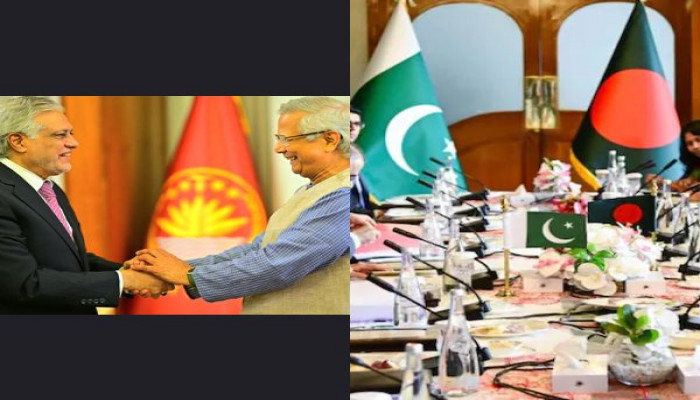Bangladesh rejects Pakistani Minister’s claim that 1971 war disputes were settled twice
- In Reports
- 06:36 PM, Aug 25, 2025
- Myind Staff
Bangladesh’s foreign adviser on Sunday raised “unsettled” issues, including an apology for the 1971 war, in talks with Pakistan’s Foreign Minister Ishaq Dar, but said he did not agree with the position of the most senior Pakistani visitor to Dhaka since 2012.
Dar, who arrived in Dhaka on Saturday for a two-day visit to improve relations after the ouster of long-time prime minister Sheikh Hasina last year, met interim government Foreign Adviser M Touhid Hossain.
“Absolutely, I don’t agree (with Dar). If it had been so, the issues would have been resolved. We presented our stand and they (Pakistani side) presented theirs,” Prothom Alo reported Hossain as saying. He added that the two countries will continue discussions on these issues in the coming days.
Hossain made the remarks while briefing the press after the meeting between the two top representatives of Bangladesh and Pakistan, two nations once engaged in a bitter war.
The foreign adviser said that during the talks, Dhaka had pressed for the resolution of pre-independence financial matters, the repatriation of stranded Pakistanis, and to “request them to make amends, the apology for the genocide that occurred here (in Bangladesh in 1971).”
“I have vociferously defended the Bangladesh position,” Hossain said. When asked if he agreed with Dar’s remark that the 1971 problems had been “settled twice,” he replied, “It would be incorrect to anticipate 54-year-old issues being sorted out in one day.”
Speaking to journalists, Dar, who is also Pakistan’s deputy prime minister, said that the matters related to 1971 had been addressed twice, first in 1974 through tripartite talks with New Delhi.
“Subsequently, the then president Pervez Musharraf resolved the matters of genocide once again during his visit to Dhaka when he spoke publicly with an open mind,” Dar said.
He added that the possibilities of “doing good for the two peoples of our two nations are tremendous.”
This was not the first time that Dhaka raised the 1971 issues with Pakistan.
In April, during the first foreign secretary-level talks in 15 years, Bangladesh had called on Pakistan to resolve unsettled historical matters, including the division of pre-independence assets, and demanded a formal apology for the atrocities of the 1971 Liberation War.
Pakistani troops were accused of genocide and widespread killings during the war, in which millions of people were killed.
The recent exchanges came against the backdrop of changes in regional politics after Hasina’s Awami League government was toppled on August 5, 2024, by a student-led movement, and Muhammad Yunus took charge as the head of the interim government.
Hossain said that one agreement and five memorandums of understanding were signed between the two countries, and both sides agreed to push bilateral relations forward while keeping dialogue open on unresolved historical issues.
Relations between Bangladesh and Pakistan had been at their lowest during Hasina’s tenure, particularly after her government began in 2010 the trials of those accused of collaborating with the Pakistani army during the 1971 war.
Hasina’s government was removed on August 5, 2024, and Yunus assumed office as chief adviser after she left for India.
This political shift opened the way for renewed ties with Pakistan as Dhaka’s relations with New Delhi cooled, although India had remained Bangladesh’s closest partner under Hasina.
Hina Rabbani Khar was the last Pakistani foreign minister to visit Dhaka in November 2012 to invite Hasina to a summit in Islamabad.
On Sunday, at the level of foreign ministers, Bangladesh and Pakistan reaffirmed their commitment to strengthen bilateral relations, which the state news agency Bangladesh Sangbad Sangstha said would be based on mutual respect, understanding and cooperation.
The two countries also discussed expanding trade and investment, with annual turnover still below USD 1 billion, Hossain told reporters.
He said Bangladesh had sought greater access to Pakistani markets under the South Asian Free Trade Area agreement in sectors such as textiles, energy, medicines, agriculture, fisheries, livestock and information technology, while Pakistan expressed interest in exporting energy to Bangladesh.
On Saturday, Dar also held meetings with leaders of several political parties in Bangladesh to strengthen ties.
He met with leaders of the Bangladesh Nationalist Party of former prime minister Khaleda Zia, Jamaat-e-Islami, and the student-led National Citizen Party at the Pakistan Embassy in Dhaka.
Abdullah Muhammad Taher, a Jamaat-e-Islami leader who had opposed Bangladesh’s independence in 1971, and Akhtar Hossain, a senior National Citizen Party leader, both said they wanted Pakistan to address the outstanding 1971 issues to improve bilateral relations.







Comments